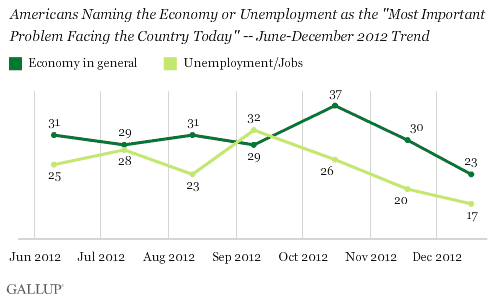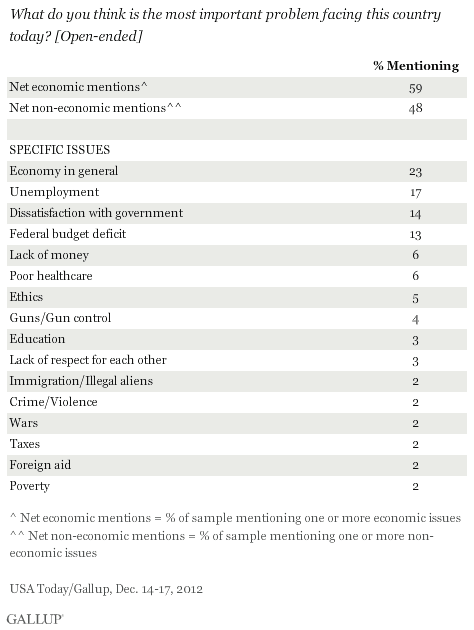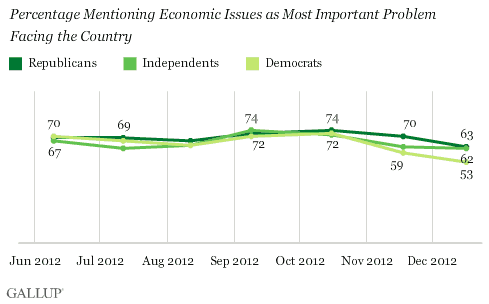WASHINGTON, D.C. -- Amid a seemingly bleak economic landscape that includes the possibility of no resolution to the fiscal cliff negotiations and news that the 17-country eurozone has returned to recession, Americans still rank the economy in general as the most important problem facing the country, with 23% citing it as the top issue. Still, this is down from 30% in November and 37% in October. "Unemployment" or "jobs" is currently second at 17%, but this is also down from recent months. These have consistently been the most-cited problems of 2012.

These results are based on a Dec. 14-17 USA Today/Gallup poll. The survey period immediately followed the deadly shooting at an elementary school in Newtown, Conn., and 4% of Americans name issues related to guns and gun control as America's most pressing priority. This is the first time in 2012 that the issue has been mentioned by more than a trivial amount of respondents. Additionally, 2% of Americans now name "crime" or "violence" and 1% "school shootings."

In total, 59% of Americans name some sort of economic issue, including the federal budget deficit (13%) or lack of money (6%), as the nation's top problem. This percentage is down slightly from the 64% naming economic problems in November, and the 2012 high of 72% who named an economic issue in October, September, and April.
Guns and Crime Rarely Spike as Issues After Shootings
It is not atypical that the tragedy in Connecticut did not dramatically change Americans' national priorities, as measured by the reaction to prior gun shootings. However, there is evidence of a slightly more meaningful impact compared with the most recent shootings, but comparatively less than the impact of the 1999 Columbine High School shootings in Colorado.
In an August 2012 poll, after a July mass shooting at an Aurora, Colo., movie theater that left 12 dead, only 1% of the public saw "crime" or "violence" as the nation's top problem and "guns" or "gun control" was also rarely mentioned. Neither figure was materially different from the poll prior to the shooting.
In February 2011, after shootings in Tucson, Ariz., in January of that year that injured then-Rep. Gabrielle Giffords and resulted in six deaths, a mere 1% offered "crime" or "violence" as the most important problem and again, "guns" or "gun control" barely registered.
Further back, the 2007 Virginia Tech slayings -- still the deadliest mass shooting in this country's history -- did not cause a significant percentage of Americans to focus on issues of crime and guns: 3% in a May 2007 poll said crime and 1% said guns were the main issues at hand. This was also little changed from the prior survey.
Only the April 1999 Columbine High School shootings saw a noticeable spike in concern over crime. In a May 1999 poll, 24% said crime was the most important problem -- up from 13% in the previous poll, from January of that year. Ten percent of respondents prioritized guns or gun control after the shootings, whereas it received no support before them.
Democrats Less Likely to Name Economic Problems as Top Priority
The decline in the percentage of Americans naming an economic issue as the country's most important problem is largely a result of Democrats' being less likely to do so. Compared with earlier in the year, Democrats became less likely to name economic issues after Democratic President Barack Obama was re-elected in November. Currently, 53% of Democrats name economic issues, down from 63% in November and 72% in October, just prior to the election, when their views were on par with Republicans' and independents' views. Greater concerns about gun violence may partially explain the most recent decline in Democrats' economic anxiety, as well as findings that show Democrats are more upbeat when rating their lives.

Republicans are also less worried about the economy now compared with recent months, but the decline has been less dramatic -- to 63% this month, compared with 70% in November and 74% in October. Sixty-two percent of independents now see the economy as the paramount priority; this is virtually unchanged from November.
Implications
Americans continue to see the economy as the country's most important problem, though to a lesser extent than in recent months. This may be the result of a general, if unsteady, upward trend in Americans' economic confidence, or a shift in some Americans' attention to the issues of guns and crime after last week's deadly school shootings, or other factors. Failure to pre-empt the spending cuts and tax hikes associated with the fiscal cliff could easily reverse these gains, as 68% of Americans say such would have a negative impact on their financial situations.
While no doubt every American was deeply saddened by the events in Newtown, Conn., most do not view crime or gun violence as the nation's pre-eminent concern, at least right now. However, this most recent shooting has had slightly more of an impact in terms of changing some Americans' national priorities than recent mass killings. Whether this shooting marks a sea-change in terms of public opinion regarding gun control cannot be determined from this poll, though Gallup has found that Americans are most likely to say an increased police presence at schools or increased government spending on mental health screenings are the best way to prevent future shootings -- solutions that do not necessarily involve action by the federal government, but by local governments. In other words, Americans may see this issue as not so much a national challenge, but a series of local ones.
Survey Methods
Results for this USA Today/Gallup poll are based on telephone interviews conducted Dec. 14-17, 2012, on the Gallup Daily tracking survey, with a random sample of 1,025 adults, aged 18 and older, living in all 50 U.S. states and the District of Columbia.
For results based on the total sample of national adults, one can say with 95% confidence that the maximum margin of sampling error is ±4 percentage points.
Interviews are conducted with respondents on landline telephones and cellular phones, with interviews conducted in Spanish for respondents who are primarily Spanish-speaking. Each sample includes a minimum quota of 400 cellphone respondents and 600 landline respondents per 1,000 national adults, with additional minimum quotas among landline respondents by region. Landline telephone numbers are chosen at random among listed telephone numbers. Cellphone numbers are selected using random-digit-dial methods. Landline respondents are chosen at random within each household on the basis of which member had the most recent birthday.
Samples are weighted by gender, age, race, Hispanic ethnicity, education, region, adults in the household, population density, and phone status (cellphone only/landline only/both, cellphone mostly, and having an unlisted landline number). Demographic weighting targets are based on the March 2011 Current Population Survey figures for the aged 18 and older U.S. population. All reported margins of sampling error include the computed design effects for weighting.
In addition to sampling error, question wording and practical difficulties in conducting surveys can introduce error or bias into the findings of public opinion polls.
View methodology, full question results, and trend data.
For more details on Gallup's polling methodology, visit www.gallup.com.
